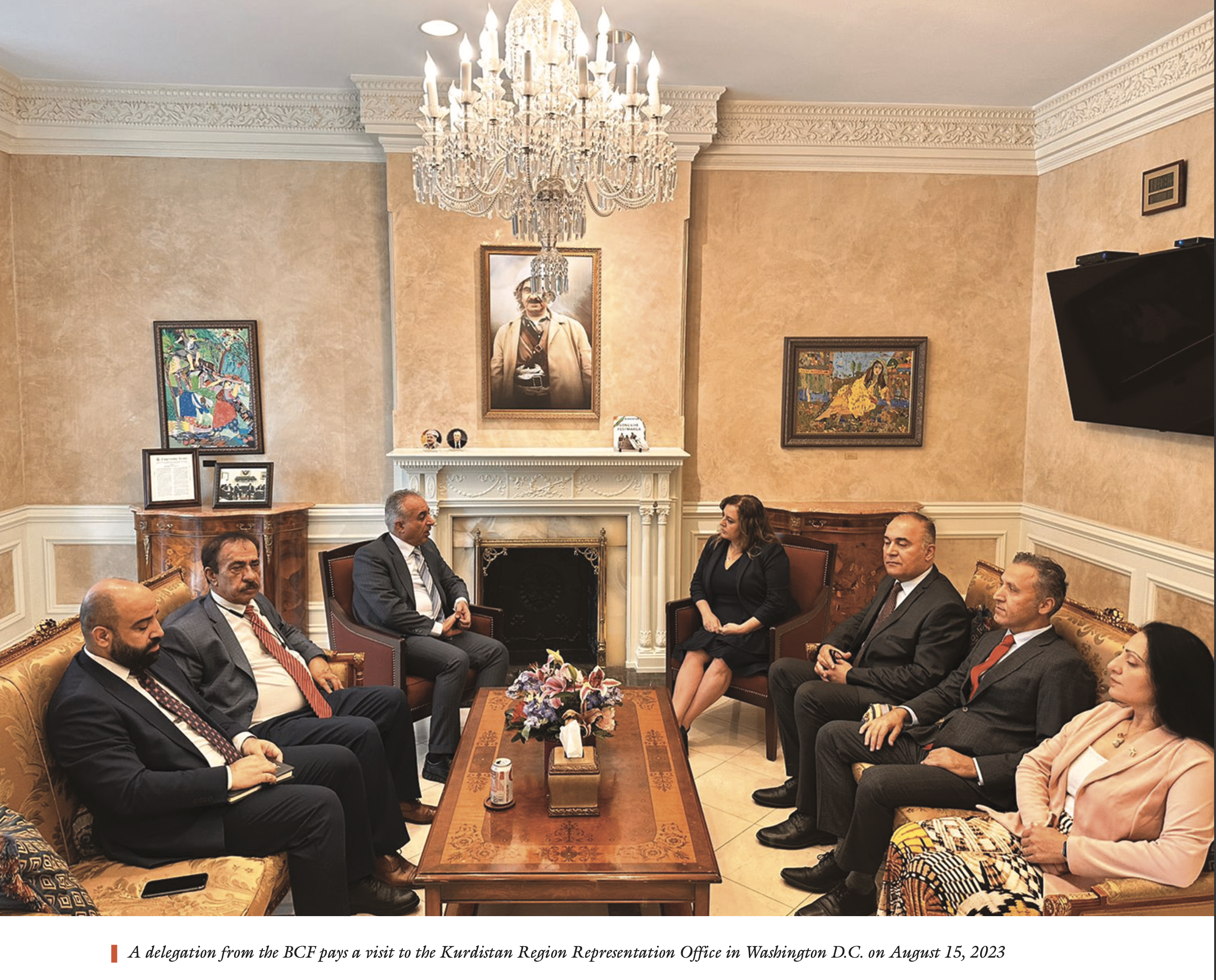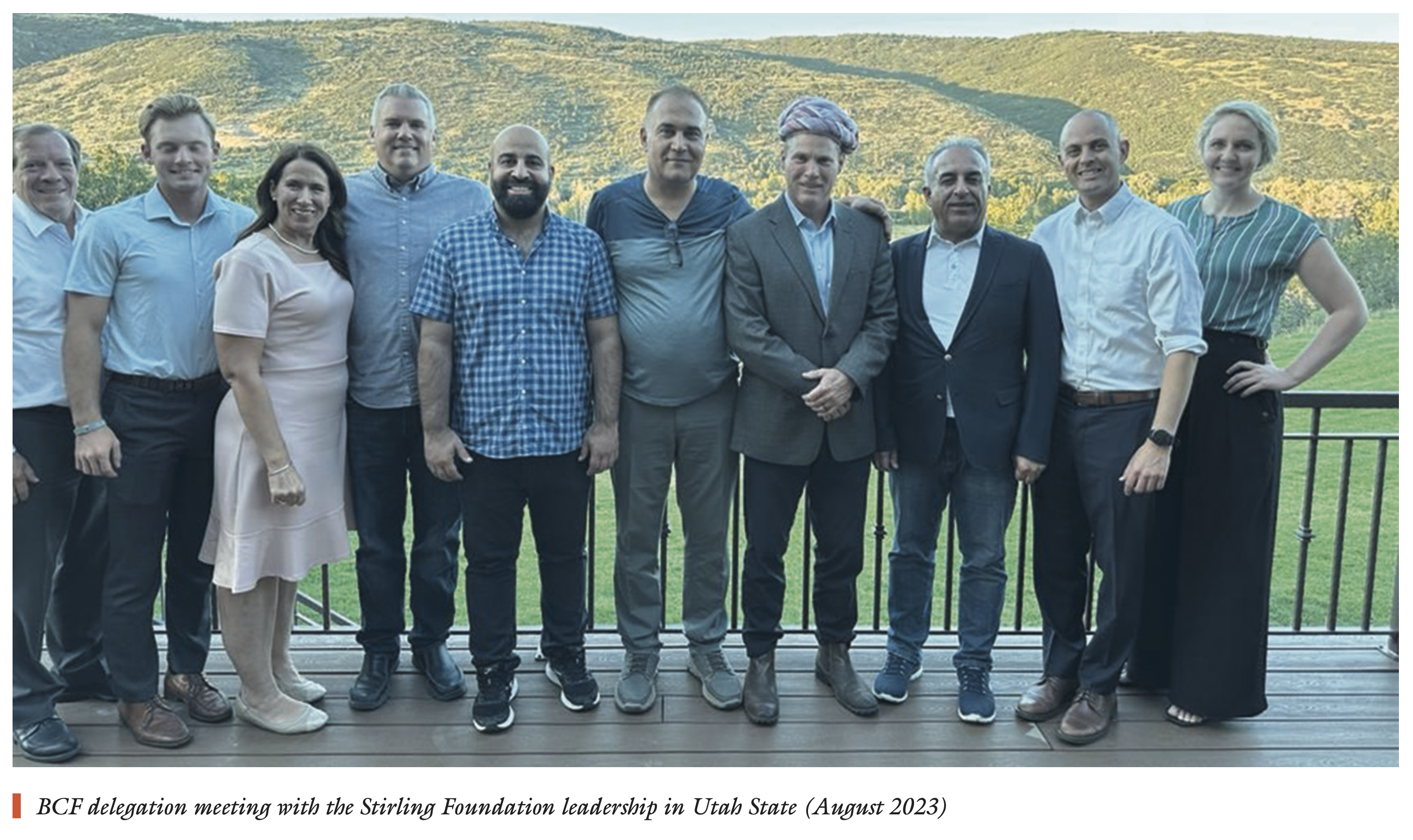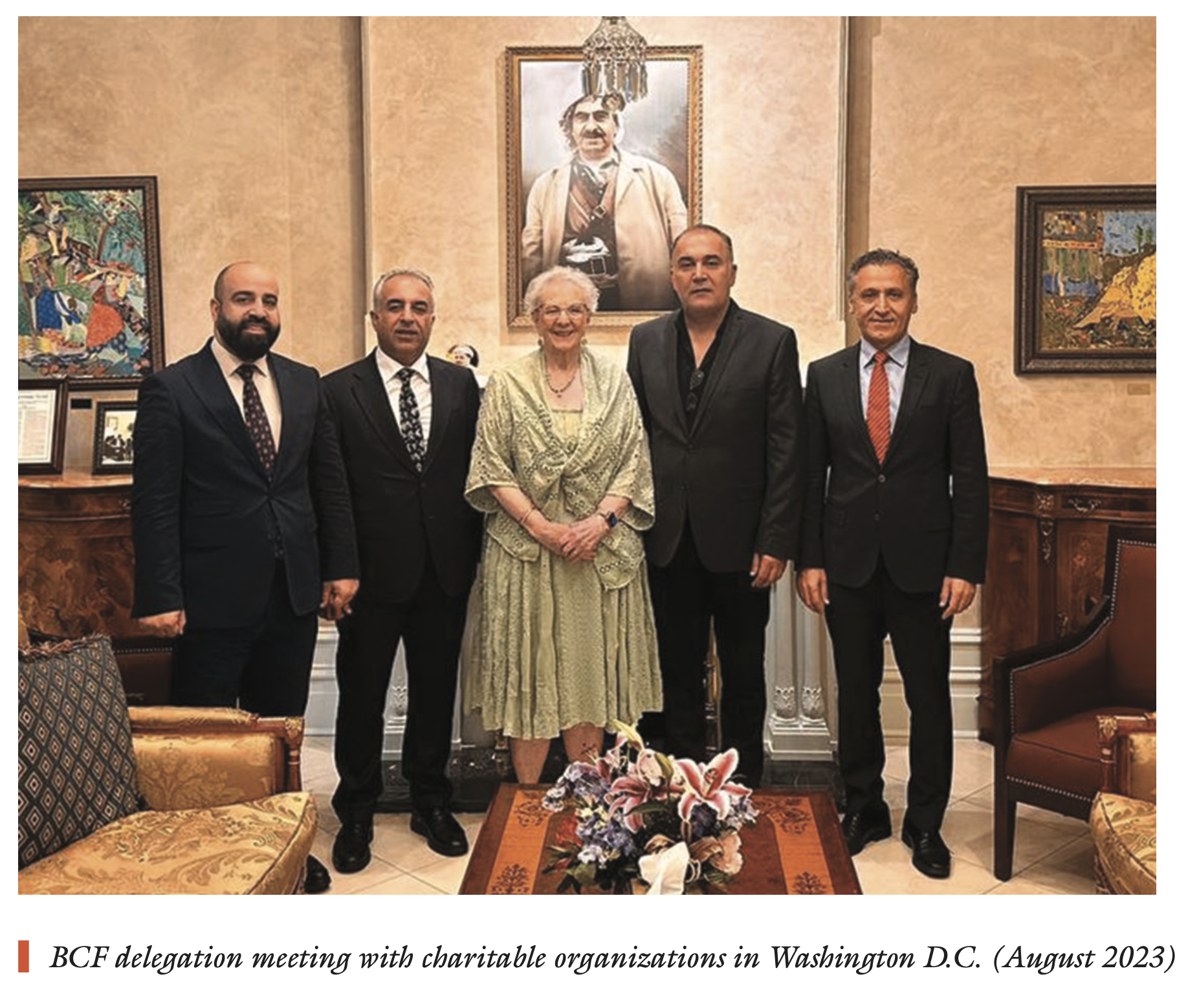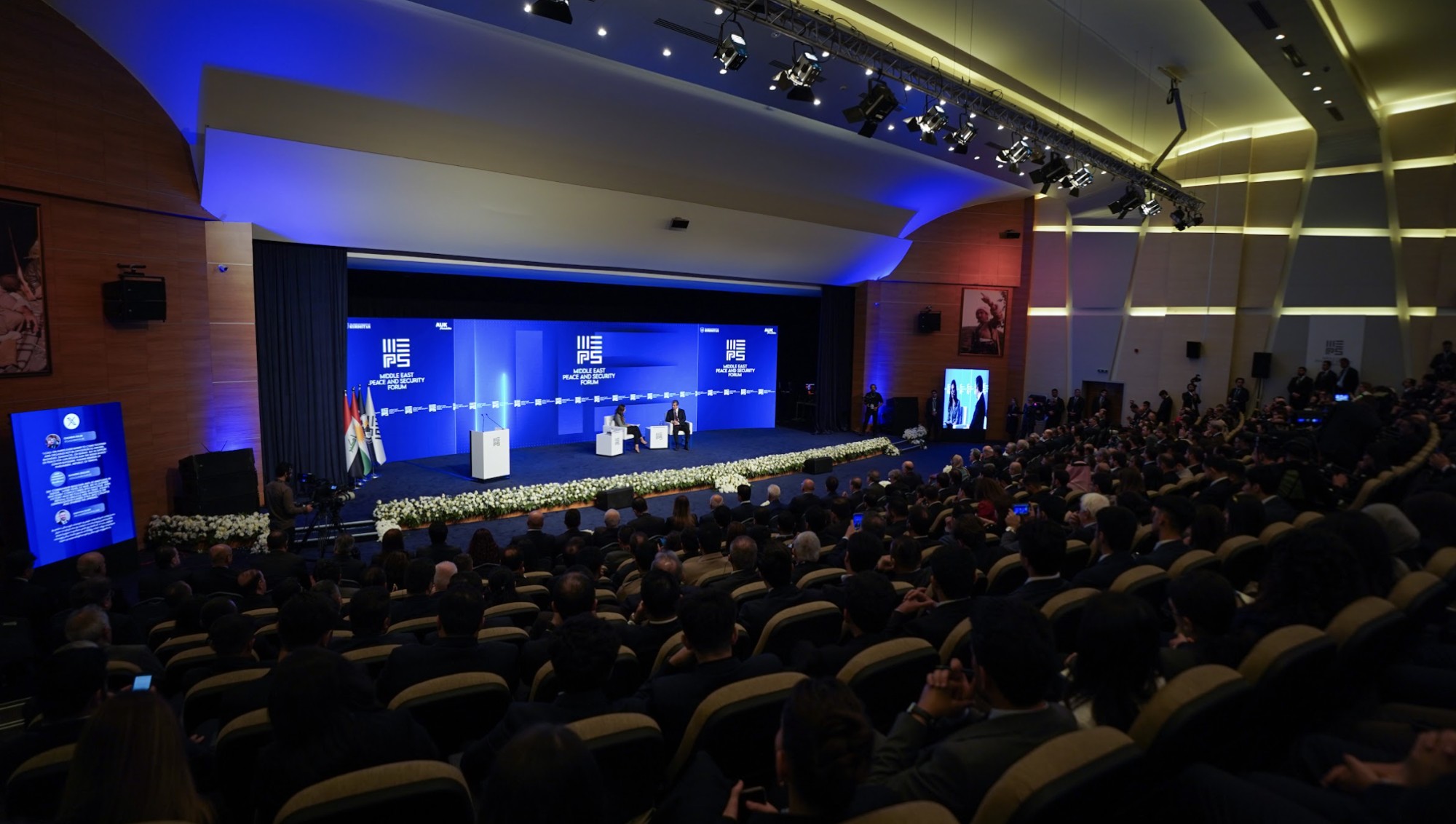Over the last decade, the Barzani Charity Foundation (BCF) and the Latter-day Saint Charities (LDSC) have been collaborating with each other to supply humanitarian assistance in Iraq and Syria. The partnership between the two organizations has saved many lives and given hope to millions of refugees and internally displaced peoples (IDPs) who have sought protection in the Kurdistan Region of Iraq (KRI).
To strengthen and elevate the relationship between both organizations and establish further collaboration between the BCF and other organizations, such as the Stirling Foundation (SF), the BCF was invited to visit the state of Utah; Dallas, Texas; and Washington, D.C. The purpose of our visit was to gain a deeper understanding of LDSC and the Stirling Foundation, which is a newly established humanitarian foundation aiming to serve humanity beyond U.S. borders and support vulnerable people, including refugees and IDPs.
Recognized globally for their humanitarian initiatives, LDSC has been actively involved in offering aid and long-term development assistance. We were eager to explore how they navigated this challenging period when many organizations had retrenched, but yet both Utah-based LDSC and SF are determined to stay in our region to address current challenges and provide hope for the future.

Visiting Utah
At a time when the majority of international non-government organizations (NGOs) have withdrawn their funding for refugees and IDPs in the KRI, our visit to the United States was prompt and significant. Funding cuts by UN agencies and international humanitarian agencies have left many vulnerable peoples without essential resources and support. Amid this challenging landscape, we discovered a glimmer of hope during our visit to Utah, where we had the opportunity to meet with representatives from the Church of Jesus Christ of Latter-day Saints, including Elder David Bednar, Elder Anthny S. Perkins, Patrik Kearon, sister Sharon Eubank, and Boyce Fitzgerald, and most of the leadership of LDSC and SF.
The Church and its charity wing display a commitment to humanitarian efforts that is truly inspiring. We also had the opportunity to meet with the leadership of the Stirling Foundation, including President and CEO Edward, Vice President Nicole Stirling, Director of The Middle East and Europe Brittany Stirling, President and Board Director Miles Hansen, and Sally Johnson. Also headquartered in Utah, SF plays a significant role in humanitarian initiatives in our region.
Our visit culminated in a meeting with officials from the U.S. State Department, where we discussed the urgent need for alternative sources of funding and explored potential collaborations to address this pressing issue. Despite the difficult circumstances, our meeting with LDSC, SF, and State Department officials who are active in the KRI and northeast Syria shed light on potential avenues for assistance that could alleviate the hardships faced by refugees and IDPs in the KRI.

A beacon of hope
The first leg of our visit was in Salt Lake City, where we were blessed to have the opportunity to engage with the Church of Jesus Christ of Latter-day Saints and witness their significant role in supporting these vulnerable populations in the United States and worldwide. The coordination between the Church, people, and humanitarian organizations is truly miraculous. The Church’s leadership, from the perspective of both faith and charitable activities, is a great example of how humanity should be served.
The Latter-day Saints community in Utah has emerged as a beacon of hope, offering vital assistance and resources to refugees and IDPs in our region. Their unwavering commitment toward providing shelter, education, healthcare, and food has profoundly improved the lives of those affected by displacement in the last decade.
Before our departure from Salt Lake City we had the privilege to meet with other organizations such as Brigham Young University to discuss how to help underprivileged people in the KRI earn educational certificates and be better prepared for employment opportunities. We also met with the former Governor of Utah Gary Herbert to discuss future KRI-Utah commercial relationships and how to better connect both regions.
Additionally, we found some time to connect with the Kurdish and Iranian diaspora in Utah to discuss the current humanitarian situation in our region and how to better serve each other in the future. We learned about the common values and historical ties between the Church of Jesus Christ of Latter-day Saints and the KRI, two communities that have faced persecution and hardship to become dedicated to serving humanity.

Meeting with the U.S. State Department
During our visit to the United States, our meeting with the U.S. State Department, including the head of the Iraq desk; the KRI desk; the Bureau of Population, Refugees, and Migration; the United States Agency for International Development; and the northeastern Syria desk was crucial. It was a key opportunity to discuss humanitarian and other issues that impact refugees and IDPs in our region. One of the aims of our meeting was to provide factual information about the current situation of refugees and IDPs at the camps.
The UN High Commissioner for Refugees has been a vital agency over the past decade, providing leadership and funding for camp management. However, the funding for camp management and services has been cut by approximately 30%. Another example that we highlighted at our meeting with the State Department was the complete withdrawal of services provided by UNICEF.
The World Health Organization currently provides a very small amount of medicine to the camps, and above all the Iraqi Government and Ministry of Migration of Iraq play an even less significant role. For example, this year the Government of Iraq has provided just four food baskets to IDPs and no aid whatsoever to refugees.
The meeting allowed us to evaluate the State Department's response to this challenging situation, as its role in addressing humanitarian crises is crucial, particularly when local NGOs are unable to provide necessary support.
Building support
The BCF’s visit to the United States was a very significant step toward connecting with the international community, particularly U.S. donors, who have been open-handed in contributing to humanitarian aid in Iraq and Syria. During our visit to Washington, D.C., we were honored to meet with our partner organization Peace Wind of America (PWA) at their headquarters to evaluate past and current projects that serve refugees and IDPs in camps in the KRI. We aimed to expand our collaboration and go further to narrow the gap between people.
This visit was also a prime opportunity to reconnect with the Kurdish community in Dallas, Texas, where we had a successful meeting with Kurdish diaspora leadership and encouraged them to continue to play a vital role in humanitarian efforts in the KRI. We had a similar community meeting with the Kurdish diaspora in Washington, D.C. and showed our gratitude for their efforts to help refugees and IDPs. Lastly, we met with the new Kurdistan Regional Government (KRG) Representative Treefa Aziz and her small but very effective staff, who represent Kurdish values and interests in the United States.
The KRI were part of an international alliance, struggling against the extremist group ISIS, and the sacrifice that Kurds have made is a significant step toward global peace and security. The KRG has been a cornerstone for humanitarian efforts since 2013, having made its services – such as health, education, energy, and water – accessible to all refugees and IDPs under the KRG’s protection. The KRG has implemented a zero-discrimination policy toward anyone and everyone who lives in the KRI, as coexistence and diversity is a key part of the KRG’s Ninth Cabinet’s strategic policy. The safety and security of everyone, including religious minorities, is a top priority of the government.
The BCF will continue its work with national and international humanitarian and development agencies to improve the life of refugees and IDPs in our region and work with all stakeholders to find a safe way for people to return to their homes. Until then, the BCF appeals to the international community not to leave these vulnerable communities behind.
Awat Mustafa is a board member of the Barzani Charity Foundation and is the researcher and author of The Soul of the Mountains: The Principles and Values of Mustafa Barzani. He holds a master’s degree in International Development from Newcastle/ Northumbria University in the United Kingdom.

